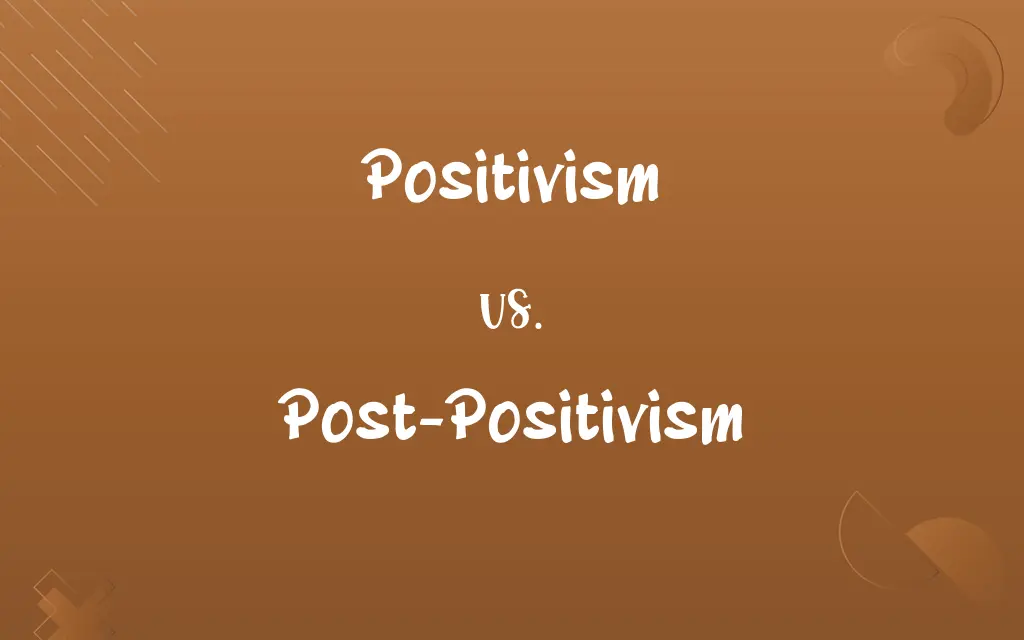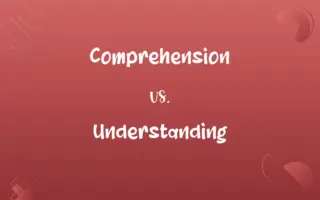Positivism vs. Post-Positivism: Know the Difference

By Shumaila Saeed & Dua Fatima || Published on May 26, 2024
Positivism emphasizes observable, empirical evidence and the scientific method, while post-positivism recognizes the limitations of pure objectivity and incorporates subjective perspectives.

Key Differences
Positivism and post-positivism are philosophical approaches that guide research methodologies, especially in the social sciences. Positivism, rooted in the idea that knowledge should be based on natural phenomena and their properties and relations as verified by empirical evidence, advocates for strict adherence to the scientific method. Post-positivism, evolving from critiques of positivism, accepts that while empirical evidence is crucial, researchers' biases and the theory-laden nature of observations mean that knowledge is provisional and subject to revision.
Dua Fatima
May 26, 2024
In positivism, reality is seen as objective and discoverable through observation and reason. This perspective implies that with the right tools and methods, researchers can understand the world fully and accurately. Post-positivism, on the other hand, contends that reality is only partially knowable, influenced by the observers' perspectives, and thus, any understanding is inherently fallible and approximate.
Shumaila Saeed
May 26, 2024
Positivism typically employs quantitative methods to test hypotheses and theories, seeking to establish general laws of behavior. Post-positivism, while not rejecting quantitative methods, also embraces qualitative research to capture the complexity of human experience and the subjective aspects of reality.
Dua Fatima
May 26, 2024
Ethical considerations in positivism are often framed around the integrity of the scientific process and the avoidance of harm, whereas post-positivism also emphasizes reflexivity, the examination of one's own role, biases, and impact on the research process.
Shumaila Saeed
May 26, 2024
The debate between positivism and post-positivism reflects broader discussions about the nature of knowledge, reality, and the best ways to understand and represent the world, influencing research design, methodology, and interpretation across disciplines.
Dua Fatima
May 26, 2024
ADVERTISEMENT
Comparison Chart
View of Reality
Objective and knowable through empirical evidence.
Partially knowable, influenced by observers.
Shumaila Saeed
May 26, 2024
Methodological Approach
Quantitative, emphasizing observation and experimentation.
Combines quantitative with qualitative methods.
Dua Fatima
May 26, 2024
Role of Researcher
Detached observer, minimizing personal bias.
Reflective, acknowledging and integrating bias.
Shumaila Saeed
May 26, 2024
Knowledge Claims
Absolute, based on observable facts.
Provisional, subject to revision.
Dua Fatima
May 26, 2024
Ethical Considerations
Integrity of scientific process, avoidance of harm.
Reflexivity, ethical responsibility in representation.
Dua Fatima
May 26, 2024
ADVERTISEMENT
Positivism and Post-Positivism Definitions
Positivism
Advocates for the use of the scientific method in research.
Through positivism, scientists aim to predict and control phenomena.
Shumaila Saeed
Feb 27, 2024
Post-Positivism
Acknowledges the complexity and subjectivity of knowledge.
Post-positivists examine how personal perspectives shape research.
Shumaila Saeed
Feb 27, 2024
Positivism
Seeks to uncover universal truths about the world.
Positivism drives the search for generalizable laws in physics.
Shumaila Saeed
Feb 27, 2024
Post-Positivism
Stresses the importance of reflexivity in research.
Researchers reflect on their biases and how they may affect their work.
Dua Fatima
Feb 27, 2024
Positivism
A belief in empirical evidence as the sole source of knowledge.
Positivists rely on controlled experiments to understand natural laws.
Dua Fatima
Feb 27, 2024
ADVERTISEMENT
Post-Positivism
Recognizes the provisional nature of understanding.
Post-positivists are open to revising theories in light of new evidence.
Shumaila Saeed
Feb 27, 2024
Positivism
Regards quantitative data as the foundation of knowledge.
Positivists analyze statistical trends to formulate theories.
Dua Fatima
Feb 27, 2024
Post-Positivism
Combines empirical evidence with theoretical frameworks.
Post-positivism uses qualitative methods to explore societal norms.
Dua Fatima
Feb 27, 2024
Positivism
Emphasizes objectivity and detachment in observation.
Positivist researchers avoid influencing the outcomes of their studies.
Shumaila Saeed
Feb 27, 2024
Post-Positivism
Values both quantitative and qualitative data.
Post-positivists use mixed methods to capture the multifaceted nature of reality.
Dua Fatima
Feb 27, 2024
Repeatedly Asked Queries
Why do post-positivists use qualitative research methods?
Qualitative methods allow post-positivists to explore the subjective meanings, experiences, and complexities of human life that cannot be fully captured through quantitative measures alone.
Hifza Nasir
May 26, 2024
Can post-positivism be considered a rejection of positivism?
Not a rejection, but an evolution that builds upon positivism by addressing its limitations, particularly the objectivity of knowledge and the influence of observer bias.
Shumaila Saeed
May 26, 2024
What role does the researcher play in positivist vs. post-positivist research?
In positivist research, the researcher is a detached observer, minimizing personal bias. In post-positivist research, the researcher is reflective and acknowledges their own biases and the impact these may have on the research.
Shumaila Saeed
May 26, 2024
What is the main difference between positivism and post-positivism?
Positivism focuses on objective knowledge through empirical evidence and the scientific method, while post-positivism recognizes the limitations of objectivity and includes subjective perspectives and the provisional nature of knowledge.
Dua Fatima
May 26, 2024
How do positivism and post-positivism influence research methods?
Positivism favors quantitative methods and empirical verification, while post-positivism incorporates both quantitative and qualitative approaches to accommodate the complexity of studying social phenomena.
Dua Fatima
May 26, 2024
What is the significance of reflexivity in post-positivist research?
Reflexivity involves researchers critically examining their own biases, assumptions, and influence on the research process, which is crucial for ensuring ethical and rigorous post-positivist studies.
Dua Fatima
May 26, 2024
Can a study be both positivist and post-positivist?
While a study typically aligns more with one philosophy, it can incorporate elements of both, especially in mixed-methods research that seeks to blend quantitative and qualitative insights.
Shumaila Saeed
May 26, 2024
How do ethical considerations differ between positivism and post-positivism?
While both approaches value scientific integrity and the avoidance of harm, post-positivism also emphasizes the ethical responsibility of acknowledging and addressing the researcher's influence on the research process and outcomes.
Shumaila Saeed
May 26, 2024
How do positivism and post-positivism view the nature of reality?
Positivism views reality as objective and discoverable through empirical research, whereas post-positivism sees reality as only partially knowable, shaped by human perception and experience.
Dua Fatima
May 26, 2024
How do these philosophies impact the interpretation of research findings?
Positivism seeks definitive, generalizable findings based on empirical data, while post-positivism accepts that findings are tentative and contextual, influenced by the researcher's perspective and the study's limitations.
Dua Fatima
May 26, 2024
Share this page
Link for your blog / website
HTML
Link to share via messenger
About Author
Written by
Shumaila SaeedShumaila Saeed, an expert content creator with 6 years of experience, specializes in distilling complex topics into easily digestible comparisons, shining a light on the nuances that both inform and educate readers with clarity and accuracy.
Co-written by
Dua Fatima






































































